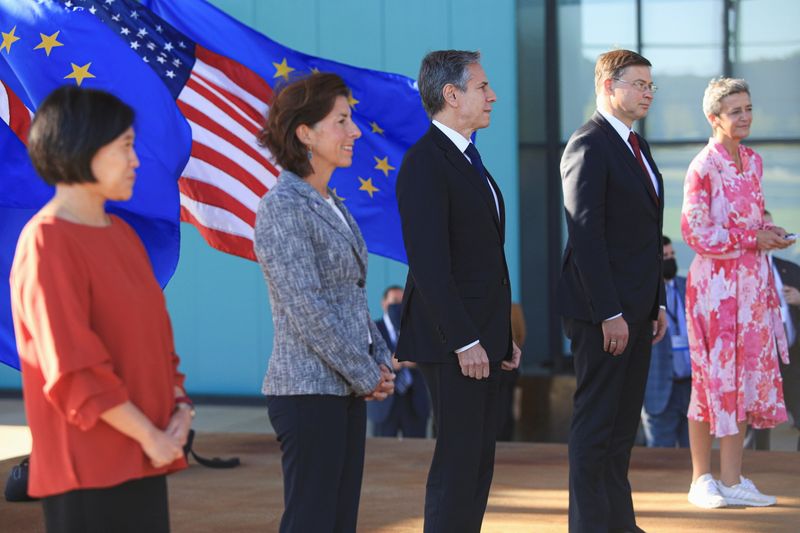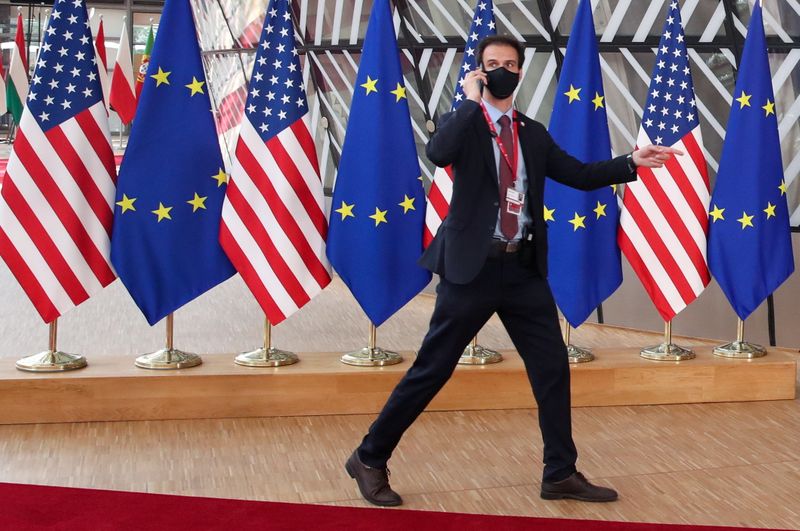By David Lawder and Nandita Bose
PITTSBURGH/WASHINGTON (Reuters) - The United States and European Union agreed on Wednesday to deepen transatlantic cooperation to strengthen semiconductor supply chains, curb China's non-market trade practices and take a more unified approach to regulating big, global technology firms.
Launching a new forum, the U.S.-EU Trade and Technology Council (TTC), senior cabinet officials from both continents also pledged to cooperate on the screening of investments on export controls for sensitive dual-use technologies and on the development of artificial intelligence (AI).
The statement did not mention China but said: "We stand together in continuing to protect our businesses, consumers, and workers from unfair trade practices, in particular those posed by non-market economies, that are undermining the world trading system."
The Biden administration has kept in place tariffs imposed by former U.S. president Donald Trump but has sought to differentiate itself by collaborating more with allies in its approach to China.
The meetings were led by U.S. Secretary of State Antony Blinken, Commerce Secretary Gina Raimondo, U.S. Trade Representative Katherine Tai, EU trade chief Valdis Dombrovskis, and European Commissioner for Competition Margrethe Vestager.
They met in a robotics and AI technology development center built inside the rusted skeleton of a former steel rolling mill topped with solar panels, a symbol of Pittsburgh's post-industrial rebirth as a tech hub.
The meeting was nearly derailed by French anger over a U.S. decision this month to supply Australia with nuclear submarines, which prompted Canberra to scrap a $40 billion submarine contract with France.
But the U.S. and EU governments backed a joint declaration to strengthen semiconductor supply chains, focusing initially on easing short-term supply bottlenecks and later on identifying longer-term vulnerabilities and "strengthening our domestic semiconductor ecosystems, from research, design to manufacturing, with a view to improving resilience."
They said they would work to avoid a subsidy race to attract chip investments and seek "the right incentives."
The statement did not specify a time frame for a second TTC meeting, but EU officials said this would likely take place in the spring of 2022 in Europe.
BIG TECH POWER
Reuters was first to report a draft statement revealing a more unified approach to limit the growing market power of Big Tech. This was echoed in the final statement that identified common areas of concern such as illegal and harmful content amplified by algorithms.
"We are committed to transatlantic cooperation regarding platform policies that focus on disinformation, product safety, counterfeit products, and other harmful content," the statement said.
With the United States and Europe trying to restrain the growing power of American tech giants such as Alphabet (NASDAQ:GOOGL)'s Google, Facebook (NASDAQ:FB), Apple (NASDAQ:AAPL) and Amazon (NASDAQ:AMZN), such cooperation would make it harder for the U.S. tech industry to fight new rules.
Vestager, who has taken a tough stance on the U.S. tech industry for years, said the discussions on AI were among the meeting's biggest takeaway.
"Minds are meeting for artificial intelligence to be trustworthy, to be human centered, and to have a risk based approach," Vestager told reporters after the meeting.
The new tech and trade council has formed 10 working groups to deepen cooperation on these areas and others that include climate and clean technologies, communications technology security, and misuse of technology to repress human rights.
Several tech trade groups in Washington said the industry does not want the United States to adopt the European approach to digital regulation.

EU officials said the meeting's participants did not discuss one of the biggest transatlantic trade irritants - U.S. tariffs on steel and aluminum that have prompted retaliatory EU duties on U.S. bourbon whiskey and motorcycles.
On Tuesday, Dombrovskis said time was running short for the sides to reach agreement before an end-November deadline, but added the EU was ready to look at similar arrangements agreed by Canada and Mexico that lifted U.S. tariffs on their steel and aluminum exports to the United States in 2019.
